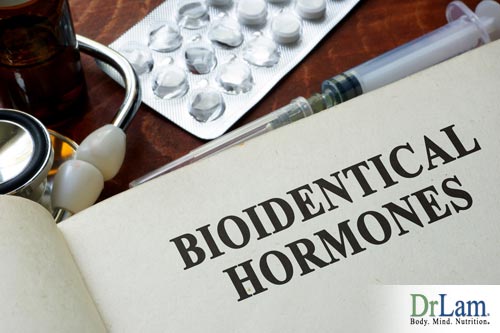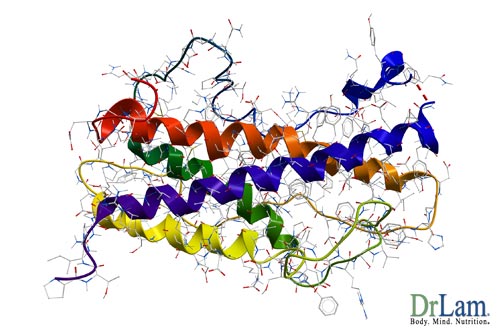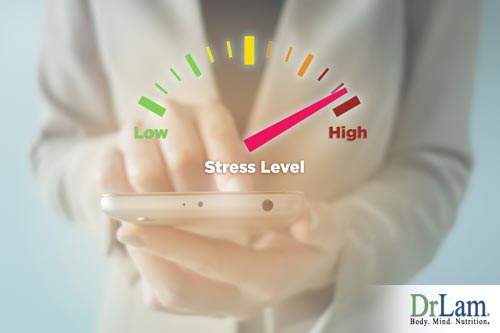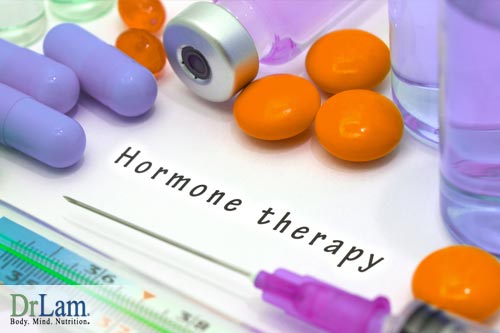Our bodies produce hormones naturally and on a continual basis. Hormones are a necessary part of how the body reacts to stimuli and maintains proper function. When we have improper or deficient hormone production, there are a multitude of consequences to physical and emotional well-being. Natural bioidentical hormones are a type of supplementation that can help to restore the balance of hormone levels within the body.
 The simplest explanation of natural bioidentical hormones is that they are a hormonal supplement sharing the same molecular structure as what is naturally produced in the body. The human body cannot distinguish a natural bioidentical hormone from what is produced in the body. Because of this, the same reaction occurs to bioidentical hormones as does to naturally produced hormones. There are many who believe this is a safer method of therapy for symptoms of menopause, and in some instances it is considered a tool for use in anti-aging.
The simplest explanation of natural bioidentical hormones is that they are a hormonal supplement sharing the same molecular structure as what is naturally produced in the body. The human body cannot distinguish a natural bioidentical hormone from what is produced in the body. Because of this, the same reaction occurs to bioidentical hormones as does to naturally produced hormones. There are many who believe this is a safer method of therapy for symptoms of menopause, and in some instances it is considered a tool for use in anti-aging.
However, where the usage of natural bioidentical hormones is concerned, the fact that many of these natural alternatives have not been as extensively studied by the FDA is a cause for concern for some medical professionals. There are differences in how some non-bioidentical hormones react within the body compared to natural bioidentical hormones. For example, some have longer solubility durations and increased specific targeting for purposes of symptom mitigation. Some bioidentical hormones are not significantly different from synthetic hormones and similar cautions apply.
There are many examples of bioidentical hormones, but cortisol gives a good in-depth picture of how deficiencies arise and can be mitigated with the use of supplements. Cortisol is a bioidentical hormone that is produced by the adrenal glands. It’s necessary for many aspects of life, and it increases in response to stress as part of the fight or flight response.
Cortisol has a normal diurnal rhythm, meaning that it increases every day when we get out of bed and then slowly declines throughout the day, until finally the levels are low enough to allow for sleep. Since cortisol is released when we encounter stress, it also contributes to fat stores, weight gain, and even insomnia. Problems arise when the body cannot produce enough cortisol due to overly high demands placed on the adrenal glands to cope with stress. This problem results in low cortisol levels, which contribute to high levels of fatigue and lethargy. Many people who experience continued stress inevitably have low or suboptimal cortisol levels.
There is a bioidentical hormone that is sometimes used for depressed cortisol production known as Cortef. This product is often used to help raise cortisol levels to a more optimal standard, allowing negative symptoms to be overcome naturally.
It is important to note that we are not suggesting anyone take medication without first speaking with a health practitioner to ensure making the right decision. Natural bioidentical hormones are not going to be the right choice for everyone. Note that cortisol is in the steroid family, which means there are quite a few possible negative side effects from usage. Identifying any illness when you are not a professional can be dangerous and should be approached with care.
 When women enter into menopause, there is no shortage of suggestions as to how they should cope with the symptoms. One popular way is through therapy using natural bioidentical hormones. There is a natural decline of hormonal output in a woman’s body as she progresses through life, and some believe that it is best to augment those lost hormones with natural bioidentical hormone replacement.
When women enter into menopause, there is no shortage of suggestions as to how they should cope with the symptoms. One popular way is through therapy using natural bioidentical hormones. There is a natural decline of hormonal output in a woman’s body as she progresses through life, and some believe that it is best to augment those lost hormones with natural bioidentical hormone replacement.
After a woman’s period stops, hormone levels fall and it often causes many uncomfortable symptoms like hot flashes, vaginal dryness, and, in some instances, it can even aggravate conditions like osteoporosis. Because of this, hormone replacement is often considered a helpful way to mitigate menopausal symptoms. There are some advantages to these types of therapies.
One of the benefits of estrogen hormone therapy is the reduction in osteoporosis risk. Estrogens are considered the most effective way of increasing bone mineral density and preventing related bone fractures in women. However, there is also need for caution because when women discontinue hormone therapy, there is often a reversion back to the rate of bone loss that they were experiencing before the therapy was used. On the other hand, there have been studies demonstrating that after long term hormone therapy, bone loss in postmenopausal patients tends to show a long term net benefit.
There are also risks involved in natural bioidentical hormone therapy using estrogen and progesterone. There have been studies suggesting that there is a correlation between hormone therapy and breast cancer, which is very concerning. There are also side effects which can appear such as breast tenderness, leg cramps, bloating, headaches, and nausea. It will depend on the individual as to whether or not these symptoms and risks are worth bearing for the benefit of lessening the symptoms of menopause. For some it may be a simple solution, but for others, it may not be worth the tradeoff.
Hormone replacement therapy is a very serious thing to consider, so every person considering its use should undertake a careful investigation of the facts before making a choice. Hormone therapy could very well impact the rest of your life. It is always best to discuss your options with a professional so that you can make the best informed decision possible. You only get one body, so it is wise to be careful with it. To read more on the safety, please click the link.
Human growth hormone (HGH) is a naturally available replacement option for those who do not produce enough growth hormone on their own. There are many people who suffer from this, and a long list of symptoms that can be present in those who are affected. These symptoms range from reduced sex drive, reduced energy, increased body fat, and reduced bone mass, to heart issues. Because of this, growth hormone levels need to be kept in check. It is estimated that there are more than ten million people in who suffer from this condition.
Growth hormone is produced in the pituitary gland below the hypothalamus at the base of the brain. It has a role in a multitude of functions including the stimulation of the immune system, increase of muscle mass, calcium retention, and strengthening of bones. There are tests that can be done to determine if you are deficient in growth hormone, and there are natural bioidentical therapies that can be administered to help you recover to normal levels.
 As with everything that alters hormone levels in the body, therapy with HGH should not be taken lightly. There are many possible negative side effects that can occur when undergoing a protocol to normalize growth hormone levels. Though it is not terribly common, people have reported joint swelling, joint pain, an increased risk of diabetes, carpal tunnel syndrome, and there is a possibility it may even increase the risk of Hodgkin’s lymphoma. It is important to be aware of a multitude of aspects involved in any therapy before you decide that it’s right for you. Click here to learn more about hgh injection.
As with everything that alters hormone levels in the body, therapy with HGH should not be taken lightly. There are many possible negative side effects that can occur when undergoing a protocol to normalize growth hormone levels. Though it is not terribly common, people have reported joint swelling, joint pain, an increased risk of diabetes, carpal tunnel syndrome, and there is a possibility it may even increase the risk of Hodgkin’s lymphoma. It is important to be aware of a multitude of aspects involved in any therapy before you decide that it’s right for you. Click here to learn more about hgh injection.
Hormones are produced by the endocrine system of the body, which is a network of glands that produce and release hormones controlling many important bodily functions. The endocrine system controls many things, including heart rate, bone and tissue growth, and the thyroid. Endocrine disorders result when glands produce either too much or too little hormone to properly regulate functions. This is often referred to as a hormone imbalance.
During hormone imbalance, the body has a dysregulated feedback system. It can’t produce enough hormones to meet demand, or it has difficulty removing hormones from the bloodstream at sufficient rates. The adrenal glands in particular, when exposed to high levels of stress, can become fatigued and unable to respond properly to the body’s needs, leading to a surprisingly common condition known as Adrenal Fatigue Syndrome (AFS).
 The NeuroEndoMetabolic (NEM) Stress Response is a system within all of our bodies which we use to help combat stressful situations. The NEM Stress Response begins in the brain. The hypothalamus is the first piece to the puzzle. Once the hypothalamus signals that there is risk, danger, or threat, the pituitary gland is triggered to act by producing hormones and further signaling to the adrenal glands. Many issues can arise when the adrenal glands are unable to produce enough natural bioidentical hormones to appropriately react to stressors, both physical or psychological.
The NeuroEndoMetabolic (NEM) Stress Response is a system within all of our bodies which we use to help combat stressful situations. The NEM Stress Response begins in the brain. The hypothalamus is the first piece to the puzzle. Once the hypothalamus signals that there is risk, danger, or threat, the pituitary gland is triggered to act by producing hormones and further signaling to the adrenal glands. Many issues can arise when the adrenal glands are unable to produce enough natural bioidentical hormones to appropriately react to stressors, both physical or psychological.
The adrenal glands are responsible for producing cortisol, a very powerful hormone that is so directly related to the stress response that it is sometimes referred to as the “stress hormone”. Cortisol has many jobs in the body, and while it can be very helpful in difficult times, it has the ability to inflict great damage to the body as well. There are a few things that take place when cortisol levels remain high for a prolonged period of time. These include sleep disruption, decreased muscle mass, high blood pressure, and increased wound healing timelines. Learn more about how to recognize the symptoms of stress here.
Because of all of the negative things associated with a poorly regulated NEM Stress Response, it is very important to mitigate any exposure to stress and control your reactions to it. It is easy to fall into a cycle of high stress, which causes many long term issues that, if directly confronted, can be lessened with personal intervention.
There is an important link between stress, hormone production, and AFS. People with AFS often suffer from many other ailments not directly related to adrenal glands. When the body is subjected to large amounts of stress, the adrenal glands respond, although over time they may struggle to cope with the continued demand for hormone production.
The adrenal glands are the workhorse of the stress response. It is important to recognize this fact because if you are experiencing stress on a continual basis, there is a high probability that you are suffering from AFS, and you may be developing a deficiency of natural bioidentical hormones.
When the adrenal glands are placed under high burdens of elevated stress, they can often fail to respond in ways that are advantageous to proper health. The adrenal glands control inflammation, immunological responses, and even play a part in regulating metabolism, so people who are suffering from AFS are placed at a high risk for developing disorders related to these functions.
 Cortisol is produced by the adrenal glands and has an important job throughout the body, not only during stressful times, but in restful times as well. It is a major player in the overall well-being of the body. Cortisol is a hormone which is essential to the maintenance of homeostasis. Cortisol regulates several things throughout the body including blood glucose levels, blood pressure, heart and blood vessel contractions, and central nervous system activation. There are daily fluctuations in the levels of cortisol that are produced and distributed within the body. It is produced in the endocrine system by the adrenal glands, which are located on top of the kidneys.
Cortisol is produced by the adrenal glands and has an important job throughout the body, not only during stressful times, but in restful times as well. It is a major player in the overall well-being of the body. Cortisol is a hormone which is essential to the maintenance of homeostasis. Cortisol regulates several things throughout the body including blood glucose levels, blood pressure, heart and blood vessel contractions, and central nervous system activation. There are daily fluctuations in the levels of cortisol that are produced and distributed within the body. It is produced in the endocrine system by the adrenal glands, which are located on top of the kidneys.
Cortisol controls many functions that are tremendously important for the body to engage in, so when there is a dysfunction in the adrenal glands’ ability to produce proper levels of natural bioidentical hormones, the results are chaotic. Issues arise when the body is exposed to elevated levels of cortisol for a long period of time, because it is not meant to be a hormone that is continually secreted at a high rate. Cortisol is intended to give us the tools we need to overcome extreme events in our lives that necessitate increased levels of alertness and physical readiness. When the extreme experiences are over, however, cortisol must decrease for normal bodily function to resume.
One major danger of long term high cortisol levels is a sustained fast paced heart rate. When the heart is overworked, cardiovascular health risks skyrocket. Heart disease is the number one killer of adults in the United States. It is always a good idea to be aware of your stress levels, and try to take the necessary steps to balance your mood and reactions to stress whenever possible.
There are always situations where things are out of your control, and in those times, it is advised to seek professional help. There is nothing wrong with understanding your limits and taking advice from a healthcare professional. Sometimes it’s the best option.
Other problems arise when there is a deficiency of cortisol, which often occurs when someone is suffering from AFS. The adrenal glands are sometimes so overworked that they enter a stage of exhaustion where they can’t keep up with the demand placed on them. This is where, in some cases, the use of natural bioidentical hormones can be a way to help the body keep up with that demand. Low levels of cortisol can render an individual weak and unable to complete the daily tasks that life requires.
 There are risks involved to supplementing with natural bioidentical hormones like cortisol. Cortisol is a steroid hormone and excess levels can have dangerous consequences, such as creating a state of high cortisol levels. When your body enters the fight or flight state, it stops certain natural processes that the body needs to maintain health. One example of this is the absorption of cholesterol. When cortisol is released in large amounts, the body does not absorb cholesterol and blood cholesterol levels remain high. This becomes an issue for cardiovascular health because the lack of cholesterol absorption allows for buildup of plaque in the arteries.
There are risks involved to supplementing with natural bioidentical hormones like cortisol. Cortisol is a steroid hormone and excess levels can have dangerous consequences, such as creating a state of high cortisol levels. When your body enters the fight or flight state, it stops certain natural processes that the body needs to maintain health. One example of this is the absorption of cholesterol. When cortisol is released in large amounts, the body does not absorb cholesterol and blood cholesterol levels remain high. This becomes an issue for cardiovascular health because the lack of cholesterol absorption allows for buildup of plaque in the arteries.
Another aspect of low cortisol levels has immunological consequences. Cortisol functions to reduce inflammation in the body, which is very helpful in times of trauma. However, over time, this continued reduction in inflammation has a negative impact on the body’s ability to mount an immunological response. The consequences of this can be serious and include increased risks for cancer, food allergies, and susceptibility to sickness. Understanding what is necessary for proper cortisol levels is somewhat complicated because there is a delicate balance the body needs to maintain good health.
There have been numerous studies that show a link between the hormone estrogen and the stress response. This is not surprising given the fact that estrogen is produced in the adrenal glands, which are a vital part of the stress response system. Read more on how stress affects men and women differently at.
A lack of estrogen hormones can make women more vulnerable to trauma during certain points in their menstrual cycles. There was a particular study conducted by Harvard researches which showed that when women had higher levels of estrogen in their blood, they were less likely to startle during trials involving their responses to fear.
This could be a good reason to attempt to balance hormones within the body with natural bioidentical hormones as long as caution is used to ensure proper levels are maintained.
Without question, there is a connection between hormones and the body’s stress response. It is not possible to maintain a healthy response to stress when your body is not producing what it needs to properly function. Though there are different opinions and approaches to this problem, it is clear that there is an important link. There are many ways to increase hormone output by supplementing with natural bioidentical hormones. Different methods of therapy have different risks involved.
Generally speaking, any form of hormone therapy should be considered as a last resort though. Once hormones are introduced into the body, the natural feedback loops that allow the body to self-regulate can become disrupted. Unexpected results could occur, and the clinical outcome is often uncertain. Having a clear time frame for taking the hormones and an exit strategy in place is important to avoid issues with tolerance, resistance, and dependency that can develop over time.
 Fortunately, in most situations the body has the ability to self regulate. Hormone replacement, whether natural or synthetic , can often be avoided if the body is given a chance to heal. For those with adrenal fatigue, this begins with fortifying and optimizing adrenal gland function.
Fortunately, in most situations the body has the ability to self regulate. Hormone replacement, whether natural or synthetic , can often be avoided if the body is given a chance to heal. For those with adrenal fatigue, this begins with fortifying and optimizing adrenal gland function.
AFS is clearly rooted in hormone deficiency, but there are many ways to replace hormones without using bioidentical hormone replacements. These include exposure to vitamin D, reduction of stress, limiting sugar in your diet, losing weight, and incorporating exercise into your routine. All of these things seem simple but are sometimes very difficult to implement. Also be sure to consider the safety of any adjustments to your routine before implementing them, especially if you are experiencing advanced adrenal fatigue or adrenal exhaustion. Read more on tachycardia symptoms.
Considering hormonal output as a factor in your body’s stress response is a good step to understanding how the entire body responds as one unit to changes in the environment. Once you begin to fit the pieces together into a larger picture, you can make the most informed decisions possible regarding your health and wellness.